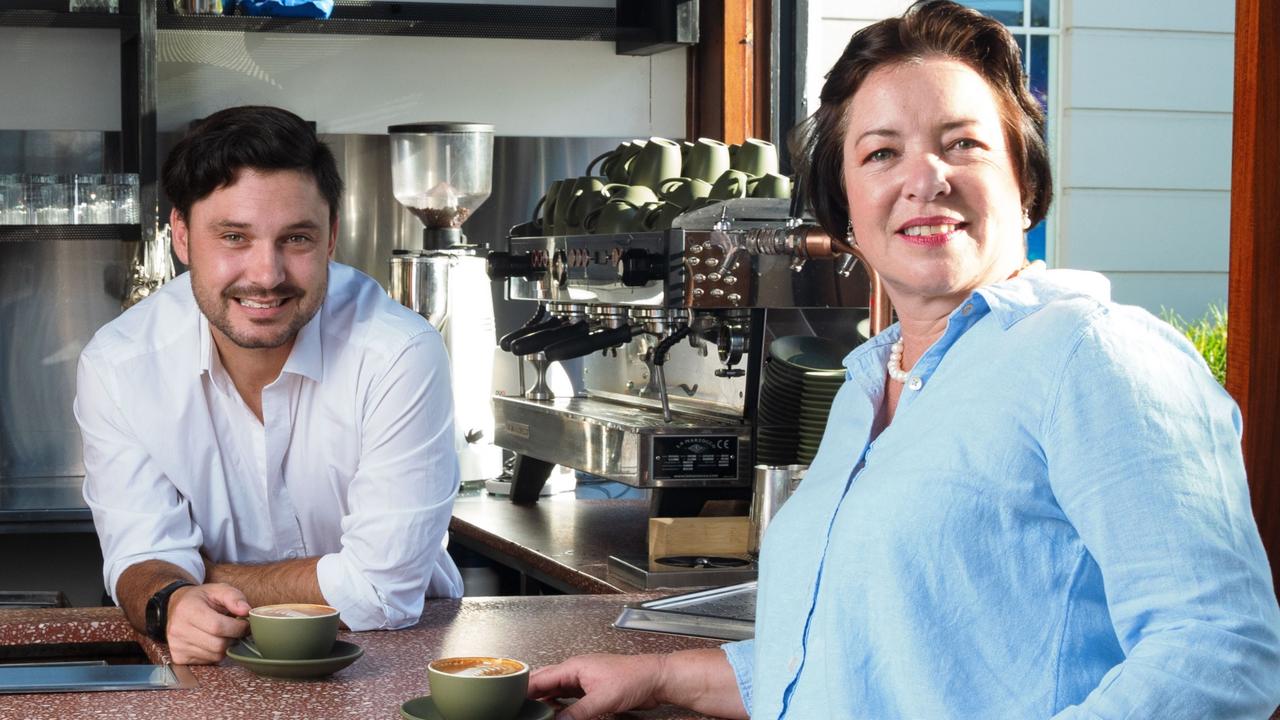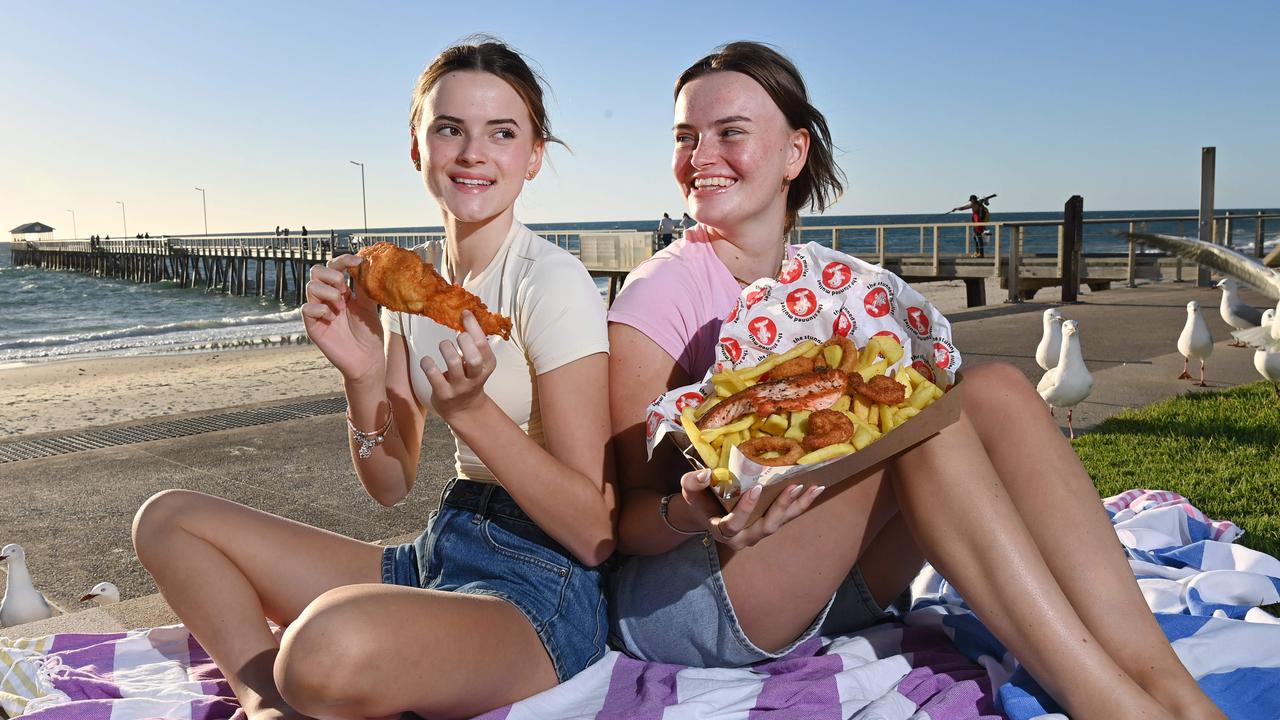How Maggie Beer became Australia’s cuisine queen
From a farm in SA’s Barossa Valley she built a multi-million dollar empire that helped make her a household name. We take a look back at Maggie Beer’s recipe for an extraordinary life in food.
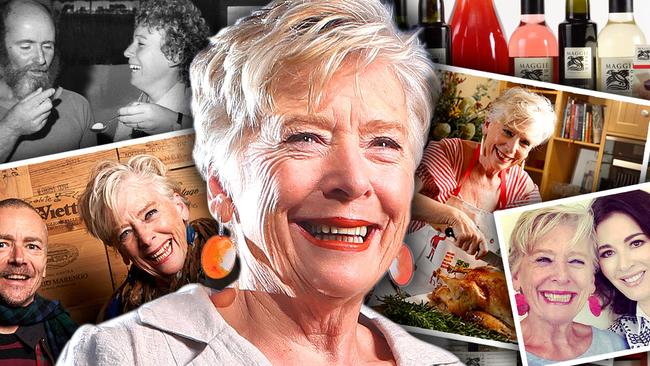
Food & Wine
Don't miss out on the headlines from Food & Wine. Followed categories will be added to My News.
Food icon, TV celebrity, writer, award-winning restaurateur, entrepreneur and soon-to-be subject of a feature film about a slice of her extraordinary life. We take a look at the incredible journey and remarkable success of Aussie culinary queen Maggie Beer.
THE EARLY YEARS
Maggie Beer was born Margaret Anne Ackerman in Sydney in 1945 to parents Ronald Ackerman and Doreen Carter. Her father’s family emigrated from Germany to work in the vineyards of the Hunter Valley.
For many years, Beer wrongly believed she had Jewish roots - a myth she finally debunked when she traveled to Germany and inspected church records on a 2009 episode of the SBS ancestry show Who Do You Think You Are?


Back in Sydney, Maggie’s parents ran a kitchenware factory but, as Maggie told SBS, lost everything when they suddenly went bankrupt.
“I remember the floor of dad’s office being covered in unopened bills and I knew things were tight…well, he was a bad business person, a dreamer but then all-of-a-sudden we lost everything overnight.”
She says the event was a “devastating” setback for her parents but one that taught her a valuable lesson that has served her well in life and business.
“What it gave me was grit and that ability to pull yourself together and make things happen,” she told the program.
Her parents gave her another gift - a love of food.
“The love of food in my family comes from my dad,” she told the SBS show.
Beer left school at 14 and had several odd jobs, including as a receptionist at a Sydney company making bedspreads, a lift operator in New Zealand and an assistant to a geophysicist with British Petroleum in Libya.
MARRIAGE AND FAMILY
Maggie and husband Colin, who is originally from the country SA town Mallala, married in 1970 and had two daughters, Saskia and Elli.
Asked on a 2021 episode of chef Gary Mehigan’s podcast, A Plate to Call Home, why she was first attracted to Colin, Beer said: “Well, because he has such humor and he makes me laugh and we’ve been married 51 years and he still makes me laugh every day.”
“He has such a wit and he comes of small business people, I come of small business people, so we were risk-takers.
“But he also supported my dream more than I supported his, because he gave me confidence in myself. I had bravado but not confidence.”
PHEASANT FARM
It was Colin’s dream that brought the Beers to the Barossa Valley in 1973.
He won a Churchill Fellowship to travel the world studying game bird breeding and in 1979, the couple opened their now famous Farm Shop at their property in Nuriootpa, where they sold direct to the public and Maggie, despite having no formal training, cooked “everything we grew”.

In 1980, the shop “morphed” into a restaurant, which went on to win the prestigious Remy Martin Cognac / Australian Gourmet Traveler Restaurant of the Year Award.
The award, says Beer, was “a turning point”, in more ways than one.
“Up until then we had been just a simple country restaurant with game as our speciality and simply following the seasons with whatever was to hand,” she writes on the Farm Shop website.
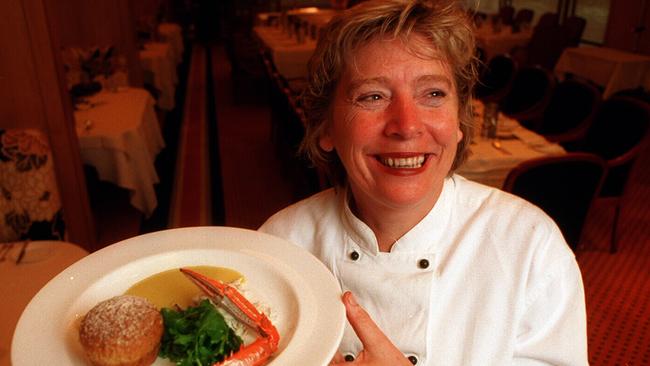
“It burnt me out, because I’m obsessive, and I wouldn’t leave the stove,” she told SAWeekend.
“And Colin came in one day and said, ‘It’s the restaurant or me’.”
Colin won out.
In 1993, the Beers made the “tough decision” to close the restaurant to focus on other areas of the business, such as their rapidly expanding pate business.
“One door had to close for others to open,” Beer wrote.
MAGGIE BEER PRODUCTS
Beer’s chicken liver pate, burnt fig ice cream, quince jam and verjuice are now staple items in fridges and pantries all over the country.
But they had their humble beginnings in the Barossa, and from Maggie’s commitment to using everything their farm, and the region, had to offer.
Beer writes on her website that she and Colin led a “worldwide renaissance” in awareness of verjuice after making their first back from Rhine Riesling grapes in 1984, and believed they were “the first in the world” to make the product commercially.

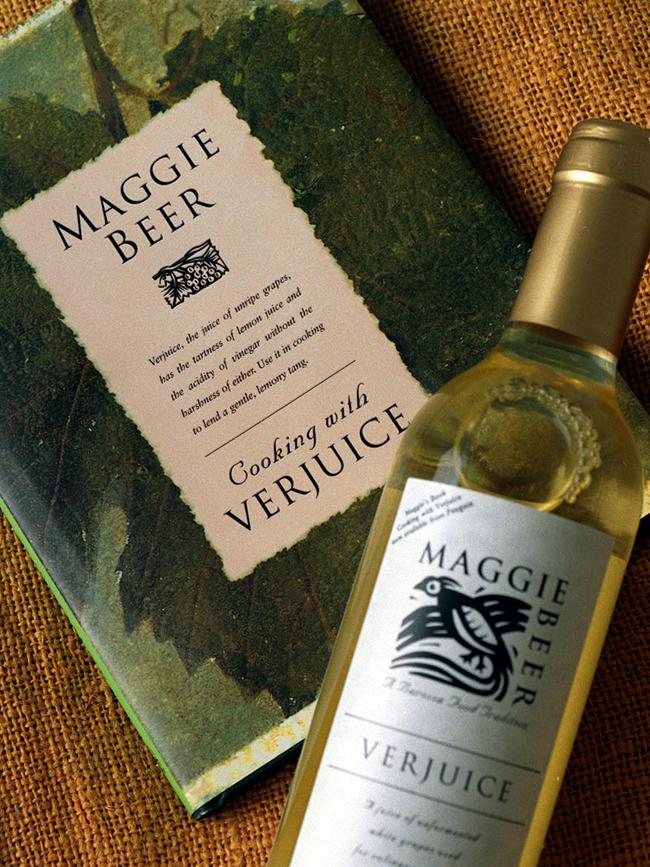
Beer says she cooked pheasants “every way you could imagine” and chickens and quinces sourced from neighbours went into terrines, quince jellies and her now-legendary quince paste.
Maggie had been selling her pate since the early 1980s, with much of the demand coming from word of mouth.
But after closing the restaurant in 1993, the Beers rapidly ramped up their commercial food business, opening a production kitchen in Tanunda in 1996.
The business enjoyed huge success over the next two decades, growing from just a handful of employees to over 100 and developing a portfolio of over 200 products.
TV CAREER
Beer’s talents in the kitchen and in business made her a legend in the food industry but TV made her a star.
Beer has appeared on several TV shows and documentaries dating back to at least to 1996 when she featured in an episode of The Food Lovers’ Guide to Australia with Maeve O’Meara.
But her big TV moment came a decade later with the ABC TV series The Cook and the Chef co-starring Adelaide chef Simon Bryant.
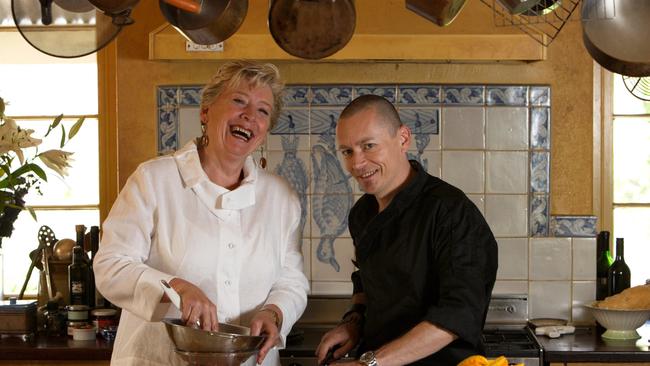
Filmed in Beer’s kitchen at Pheasant Farm, the hit series ran for 154 episodes over four seasons from 2006-2009.
The show featured special guests including Rick Stein, Margaret Fulton and Stephanie Alexander, and dedicated episodes to a range of different themes and featured ingredients.
Announcing the end of the series in 2009, Beer said: “The demands of filming on my family and business have led me to the difficult decision to leave the show.
“It’s been a privilege for me to have been able to share my passion for food with Simon and our audience.
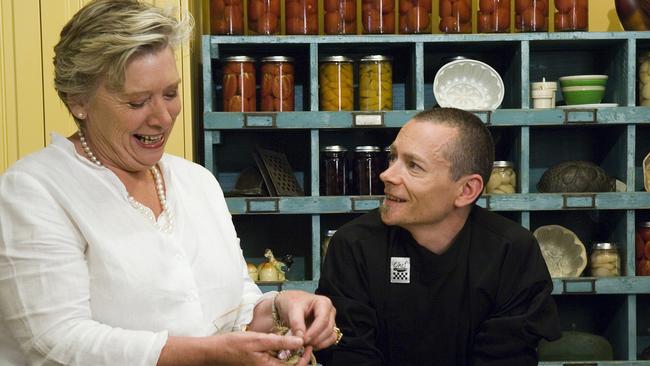
“It always gives me joy when I feel I have inspired people to explore the wonderful produce that Australia has to offer.”
Beer has also appeared on several episodes of MasterChef Australia and The Great Australian Bake Off as a guest judge.
‘MISLEADING’ LABELLING
In 2014, Beer apologised after Australia’s consumer watchdog, the ACC, ruled that four Maggie Beer products - ice cream, olive oil, biscuits and vinegar - may have misrepresented their place of origin.
This was because the products featured the words “Maggie Beer A Barossa Food Tradition” and a company address in Tanunda, but were actually made by third parties in Victoria and Queensland.
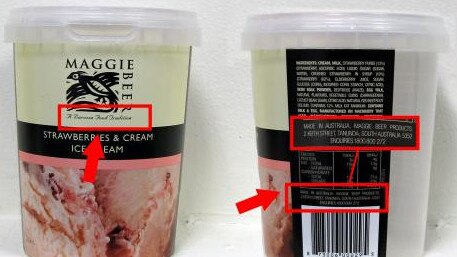
An apologetic Beer said she was “horrified” to discover she may have misled customers.
“I didn’t see this coming,” she said.
“I’m horrified that I might have misled anyone because there was never a moment’s thought that I had done that.
“Now it has been brought to my attention I have done something about it.”
She said while the products were manufactured interstate, the were developed in SA, and were initially made there, until the company grew to supply bigger markets and was unable to find SA suppliers for those four products.
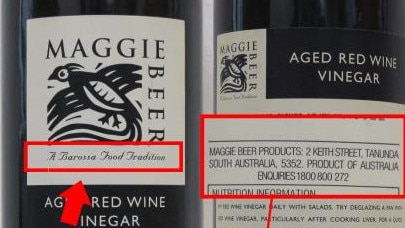
“They all start in the kitchen here with me, under my direction, from my ideas.
“It (manufacturing) only goes outside of the Barossa or SA when I get to a brick wall about equipment.
“I’m so proud of everything we do. I wish we could have kept it all within SA. But I’m using local ingredients wherever I can.”
Maggie Beer Products cooperated with the ACCC’s investigation and “acted immediately” to remove the words “A Barossa Food Tradition” from any products made outside of SA.
MAGGIE TAKES A STEP BACK
In 2016, Beer sold a 48 per cent stake in Maggie Beer Products to the publicly-listed company Longtable for $15m, with $10m going towards growth opportunities for the business including into Asia. She sold the remaining 52 per cent stake to Longtable, now known as Maggie Beer Holdings, in 2019 for $10m in cash and shares.
But as Cameron England reported, the sale represented a step back, but not out, of the business, with Beer staying on in a product development role and taking a seat on the Maggie Beer Holdings Board. The farm and Farm Shop also stayed with the family.
“The Farm Shop is the public face and will continue to be,” Beer said at the time of the sale.
As Roy Eccleston reported, the Beers made the big decision to sell their remaining stake in the company while on holiday in Spain in 2018 after Maggie decided she needed more “me time”.
“All of a sudden I want to just be free enough that if we want to go to the beach because the crabs are running, we will do it,” she said.
MAGGIE BEER FOUNDATION
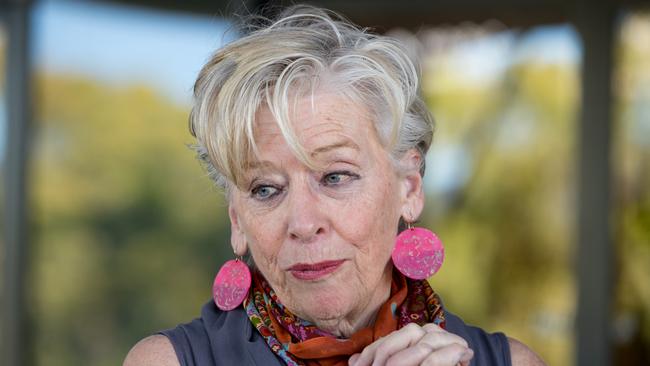
After selling the company, Beer also vowed to spend more time focussing on the foundation she set up in 2014 to help provide training and skills to cooks working in the aged care sector.
The poor quality of food in Australian nursing homes was highlighted in a series of scathing criticisms made to the recent aged-care royal commission.
“It is such a huge thing to change,” she said.
“It is going to be the rest of my life. I am on this journey and I am gathering my forces with like-minded people around Australia.
“What can be more immediate than giving people beautiful food and the difference it makes to every day in their life.’’
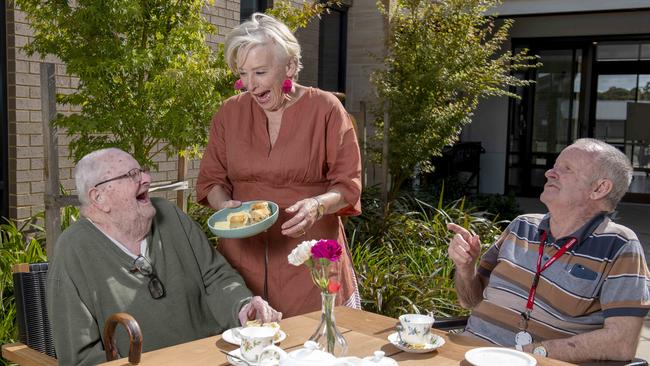
In 2014, Beer teamed up with Country Health SA to launch a trial in a hospital and nursing home to change the approach to food in aged care with a focus on fresh food and presentation.
Speaking to The Advertiser in 2021, Beer said the problem of poor nutrition in nursing homes was actually an “easy fix” and that providing good food was “dirt cheap”.
“But a lot depends on the skill and passion of the cook or chef,” she said
Beer said it was critically important that homes employed at least one chef.
According to one survey, 60 per cent of homes with fewer than 50 residents, and 30 per cent of homes with 50-99 residents, did not have a trained chef.
“On entering an aged-care home, people’s worlds become smaller and food is critical to conveying a sense of home, familiarity, value and comfort,” Ms Beer said.
Beer's passion to improve the food in aged care homes will be brought to life in a documentary to air on the ABC next year titled Maggie Beer’s Big Mission.
The show will feature Beer and her team overhauling an aged care home in Perth by transforming meals, the dining experience and the surrounds in a bid to improve the health and joy of the residents.
PERSONAL TRAGEDY
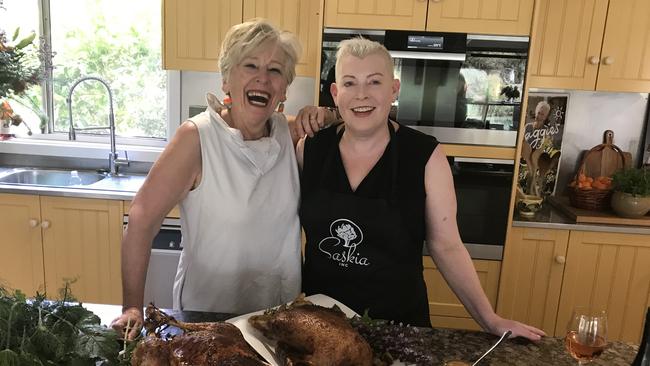
In February 2020, Beer’s eldest daughter Saskia, a highly-regarded food producer in her own right, died suddenly at the age of 46.
Beer and husband Colin announced the news, “with broken hearts”, in a post on social media and asked for time to deal with the terrible loss.
Saskia was born and raised in the Barossa and told The Advertiser in 2013, watching her parents grow and cook with their own ingredients gave her the perfect grounding for a career in the food business.
“I could see how mum would control her ingredients by telling dad what she wanted her pheasant to be like – that’s how I learned,” she said.

“Growing the food and cooking it in our restaurant was fantastic – we were living it well before it became something sexy to do.”
In 1997, when she was in her mid-twenties, she launched Saskia Beer Farm Produce, which had an emphasis on free-range and chemical-free products.
She also sold her products weekly at the Adelaide Farmers’ Market since 2013 alongside husband Peter Jercic, who continues to run the business.
Speaking for the first time about Saskia’s death, Beer described 2020 as the worst of her life.
“Your life is changed forever and this year has been the worst of my life,” Beer said in an interview with The Australian Women’s Weekly.
“I don’t know that you do cope. You find things to do, to engage you.”
In 2022, the Beer family created a Churchill Fellowship in Saskia’s honour, to support people with a passion for food to pursue “innovative, artisanal, sustainable, regenerative and community focused approaches to food production”.
IMMORTALISED IN ART
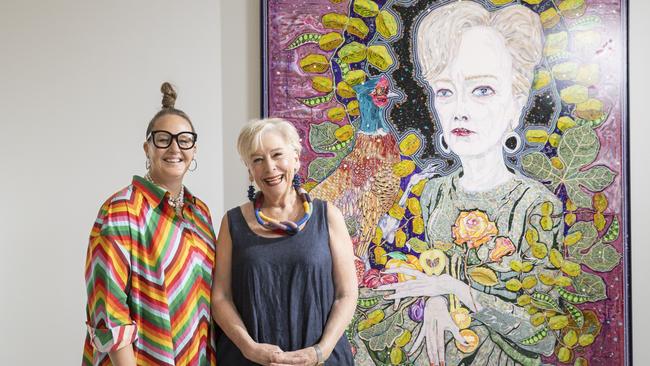
Beer is now creating a stir in Canberra’s National Portrait Gallery.
The Barossa businesswoman, restaurateur, television star and cook has been immortalised by Sydney-born artist Del Kathryn Barton, a two-time winner of the prestigious Archibald Prize.
Commissioned by the gallery, the portrait shows Beer surrounded by a few of her favourite things.
“The pheasant and the pomegranate, the quince and the roses. Oh, and the peas,” Beer noted with delight, when the portrait was officially unveiled in early December.
Famous for her fantastical, decorative works, Barton – who won the Archibald in 2008 for a self-portrait with her children and in 2013 for a Hugo Weaving portrait – said Beer was “a true queen” living “an incredible life”.
“(She is) so beautifully her age, but transcendent of age,” Barton said, adding: “She fills up a room with light and energy and generosity.”
Maggie, 2023 by Del Kathryn Barton will be on display at the National Portrait Gallery during summer.
COOKBOOK MOVIE
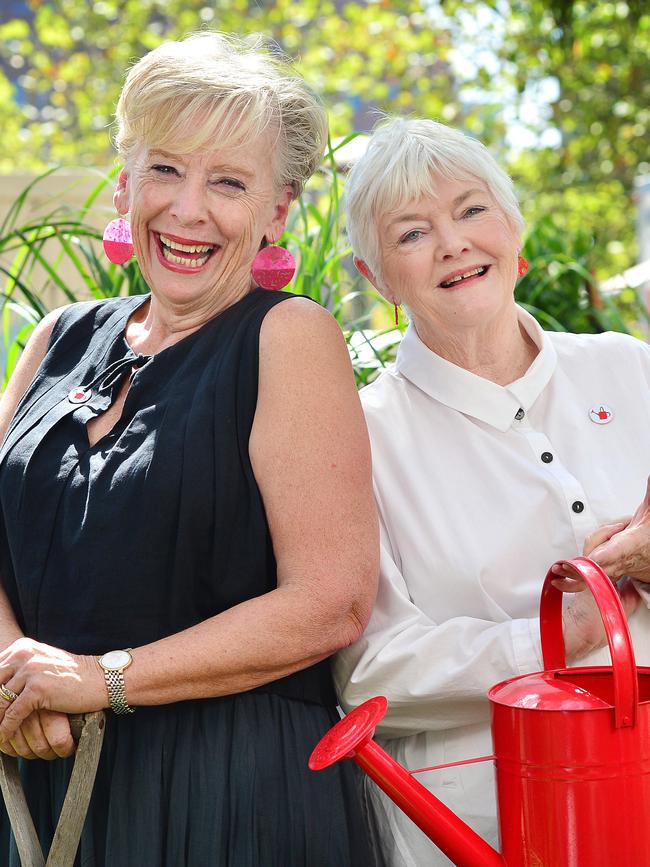
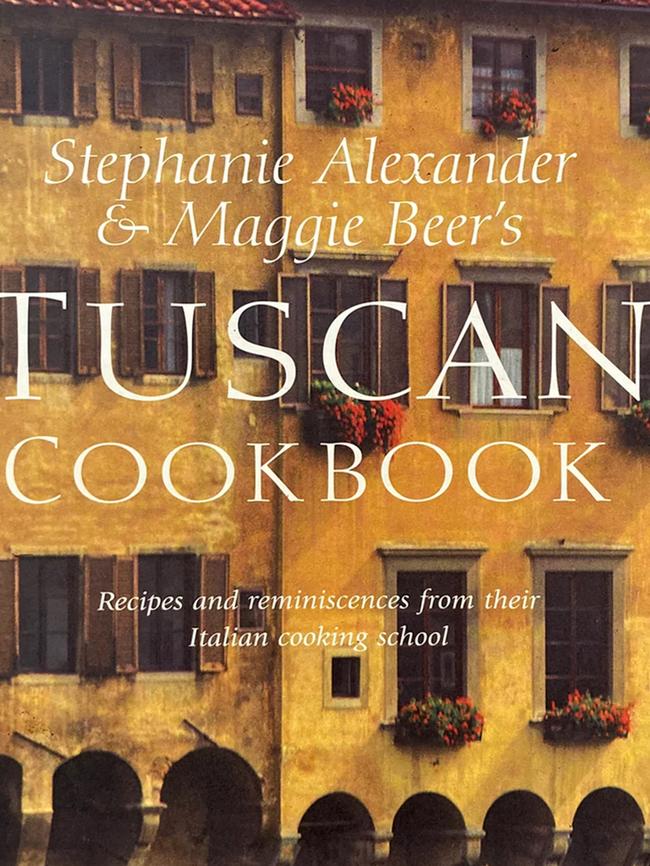
Beer’s extraordinary life is destined for the big screen. Well, one exciting chapter at least.
In 1998, Beer and good friend Stephanie Alexander wrote their Tuscan Cookbook, based on a sojourn to Italy in 1997.
Published in 1998, the book chronicles Beer’s and Alexander’s time in Tuscany where, for three months, they ran a cooking school in a villa south of Siena.
In May, 2022 it was announced the pair’s food adventures in Italy would be turned into a movie script by screenwriter Katherine Thomson.
At the time of the announcement, the project was still in its infancy and Thomson wasn’t giving away any clues as to who might be cast to play the central characters except to say “These are two great roles for two great international actors”.
Beer described news of the project as “totally unbelievable”.
“There are times of your life that are so wonderfully significant that you have to pinch yourself that it were even possible,” she said.
There have been minimal updates since the project was announced and a release date is not yet known.

